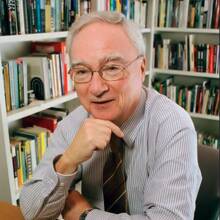Brothers' Keepers
Critics who attempt to explicate religious themes in literature that does not feature overtly religious content must tread very carefully. A scholar undertaking a theological reading of Milton’s Paradise Lost or Eliot’s Four Quartets walks safely on well-trod ground, but undertaking a similar analysis of the apparently secular novels of John Updike or the films of John Ford can be dangerous. An overly creative interpretation of the texts presents an ever-present risk of distortion. Such a study demands modesty, care and rigor.
These virtues abound in this work by Christopher J. Wheatley, Ordinary Professor of English at The Catholic University of America. For many contemporary readers, the name Thornton Wilder inevitably brings up recollections of countless productions of “Our Town,” a play beloved by amateur theater companies because of its low-cost, bare-stage presentation and apparently simple, even sentimental message. Professor Wheatley corrects this distorted perception of a prolific novelist and playwright who, in a career that lasted over 50 years, received three Pulitzer Prizes—for the plays “Our Town” (1938) and “The Skin of Our Teeth” (1942) and the novel The Bridge at San Luis Rey (1927)—and a National Book Award for his novel The Eighth Day (1967). His play “The Matchmaker” (1954) became the basis of the Broadway musical “Hello, Dolly.” Thornton’s older brother Amos was equally productive. After serving as a ambulance driver in the First World War, he was ordained a Congregationalist minister, and after finishing his doctorate at Yale, he taught theology and wrote extensively at the University of Chicago and at Harvard.
The brothers receive equal billing in the title, but not in the book. Wheatley sets out to present a theological analysis of Thornton Wilder’s vast and varied output, and he supports his conclusions by citing the scholarly essays of Amos and the correspondence between them. As Wheatley argues, both followed parallel tracks through the religious landscape of the 20th century, a journey marked by the horror of war and the Great Depression, which combined to challenge American optimism, and by the arrival of the historical-critical study of the Bible, which undermined the foundations of traditional American religious belief. In both realms, many of the anchors of the old order simply vanished.
The New England Puritanism of their heritage could not withstand the intellectual challenges of the 20th century. Both brothers grew skeptical of organized religions, in particular what they saw as the superstition and authoritarianism of Catholicism. But while Amos took a path toward the fringes of liberal Protestantism, Thornton found personal belief altogether untenable and turned to fiction. Wheatley tries to show that these two paths did not really diverge as sharply as one might think. Thornton resolutely rejected the title of philosopher or, even more, theologian, but as his exchanges with Amos reveal, he kept alert to the intellectual ideas of his time, and these new ideas gave shape and texture to his work.
Examining exactly how these religious and philosophical currents of the time flowed into his plays and novels provides the core of this study. As the young Thornton began to turn away from religion, he concluded that the problem with the churches was their use of a language that had become so exhausted that it no longer made sense in the 20th century. Since he rejected the traditional doctrinal discourse of the churches, he explored his questions of morality and ultimate realities in terms of human interactions and metaphors. Amos and Thornton investigate the same questions, but their language for posing the questions and attempting to answer them is radically different.
Thornton ended his studies and began his literary career as theologians wrestled with the credibility of a benevolent God in a world that had endured the horrors of the Great War. He wrote of civilizations breaking down: Hellenic culture in Woman of Andros (1930), Baroque Catholicism and the Enlightenment in The Bridge at San Luis Rey (1927) and the classical heritage of reason in Catholicism and the possibility of a wisdom that surpasses reason in The Cabala (1926). His reflection on an end to religion finds its metaphor in each of these works. Wheatley maintains that Wilder concluded that true Christian love must find its embodiment anew in each historical setting. In “Our Town” and “The Skin of Our Teeth” he struggles with the notion of permanence in a rapidly changing world. In Heaven’s My Destination (1935) he questions American materialism and social responsibility in a collapsing economic order. These are theological essays in literary vesture.
Wheatley presents his case in scholarly fashion. The abundant documentation provides an invaluable resource for other scholars of American religious history and American literature. Non-scholars may find the thoroughness of the work more of an obstacle than a help. The chapters presume a familiarity with the Wilders that may be beyond the capability of the casual reader. In his effort to provide a comprehensive study of both major and lesser known texts, he frequently cites characters and incidents from lesser known works without providing much context for the less scholarly. As an academic, though, Wheatley addresses a readership of peers, and he has served them quite admirably.
This article also appeared in print, under the headline “Brothers' Keepers,” in the March 26, 2012, issue.








